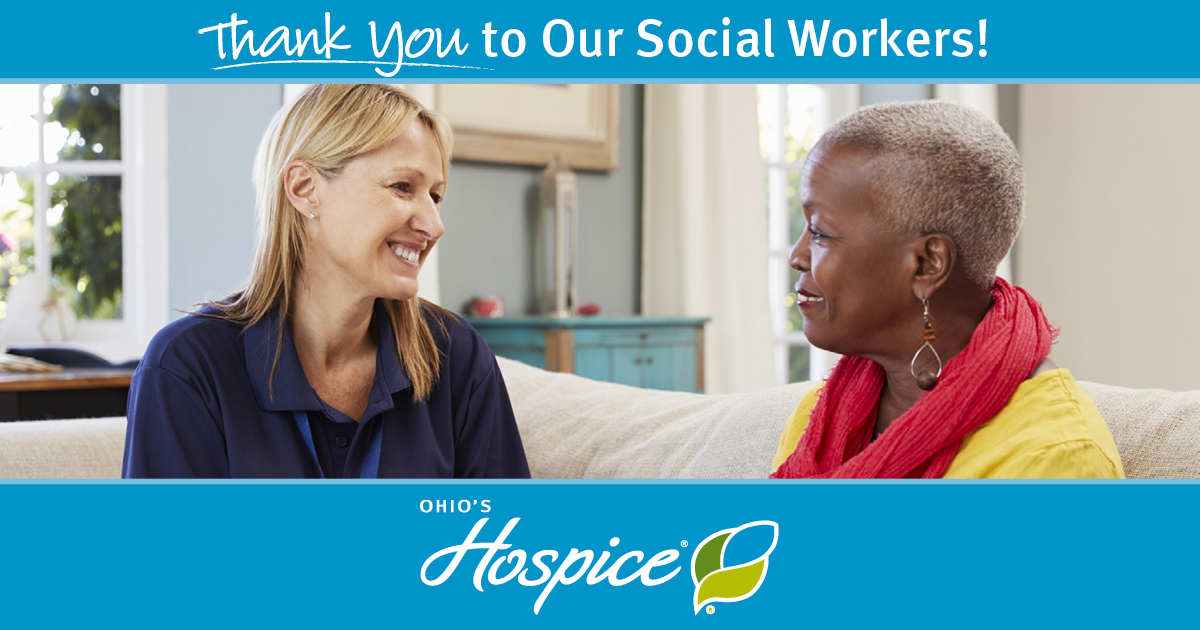
Social Workers Share Their Stories During Social Work Month
During Social Work Month, Ohio’s Hospice and its affiliates recognize and thank their social workers for their commitment to providing superior care and superior services to patients and families each and every day.
“Social workers have the privilege of walking alongside patients and families as they journey through the end-of-life process,” said Shelly McFarren, medical social worker at Ohio’s Hospice LifeCare. “We provide emotional support, end-of-life education and reassurance, caregiver support, and life affirmation and encouragement.”
Throughout the COVID-19 pandemic, social workers have continued to provide support to patients and families as they face the end of life. As an integral part of the care team, social workers:
- Bring knowledge and expertise in working with ethnic, cultural and economic diversity.
- Navigate the complexities of healthcare systems.
- Understand grief support and are focused on enhancing quality of life and well-being for patients and families.
“The best part about my role is helping a patient and their family so that the person passes peacefully,” said Sara Monroe, medical social worker at Ohio’s Hospice of Butler & Warren Counties. “I know I made a difference for them.”
Below are stories from social workers throughout Ohio’s Hospice. They share why they became a social worker and some of their favorite memories.
Rachel Norwich, medical social worker at Ohio’s Hospice LifeCare, became a social worker because she wanted to help people. She explained that social workers have to be flexible and ready for all types of situations.
Her favorite aspect of social work is serving patients and families. “Social workers have a commitment to serve others and improve the world we all live in,” Norwich said. “We help patients and families feel like they’ve been seen and heard. They are not alone in this process.”
Shelly McFarren, medical social worker at Ohio’s Hospice LifeCare, feels blessed to get to know the patients and families she serves. “I enjoy hearing about their life stories and learning from them,” she said. “I am amazed by how families love and support each other at the end of life. It is an honor to walk that journey with them.”
Marsha Potts, medical social worker at Ohio’s Hospice LifeCare, chose a career in social work because she wanted to encourage people to be the best they can be with the best quality of life possible. She provides support, education and validation to patients and families.
Potts loves to learn about patients’ stories and experiences as she gets to know them. She has many memorable experiences as a social worker. “Sometimes the most difficult situations that end in a positive manner are the most memorable,” she said.
Lindsay King, medical social worker at Ohio’s Hospice LifeCare, was inspired by her grandmother, who was a social worker. “I have always wanted to follow in her footsteps,” she said. “To this day, my grandmother is my go-to person for advice and support.”
Mark Schmidt, medical social worker at Ohio’s Hospice LifeCare, has always been drawn to helping others. He had a good friend who died from cancer after college, which cemented his desire to go into social work, specifically healthcare and hospice care.
Schmidt said the best part of being a social worker is the thanks and appreciation he receives from families. He enjoys working with the entire care team to create the best outcomes for patients and their families.
Adrienne Peters, medical social worker at Ohio’s Hospice of Dayton, said it is rewarding to help patients and families. She often sees people relax physically and emotionally as she answers their questions and eases their worries.
One memorable moment of her career came when she was helping a young family whose mother had died. As she sat with them, they were slowly able to start reminiscing about their mother, sharing memories, and eventually laughing together. “Helping to facilitate healing and meaning in that way is one of my favorite parts of this work,” she said.
Elaine Wagnon, medical social worker at Ohio’s Hospice of Dayton, became a social worker to help people. She has met some extraordinary and resilient people. She explained that the best part of her job was being able to help patients and families through the journey of the dying process.
Wagnon recalled a memorable moment as a social worker. “I was with a patient who was actively dying and had minimal family,” she said. “The patient asked me to stay with them. I held their hand and reassured them until they passed away.”
Autumn Hill, medical social worker at Ohio’s Hospice of Central Ohio, said that she always knew she wanted to be a social worker. “I cannot remember a time that I wanted to become anything else,” she said. “I have always loved fighting against the injustices that people face.”
While Hill’s day-to-day work changes daily, she notes that one constant is visiting patients and linking families to community resources.
Amanda Fazakas, medical social worker at Ohio’s Hospice of Central Ohio, explained that her workday is different every day. “My job is to go wherever I’m needed to fulfill the needs of the social worker that I am covering for,” she said. “We bring knowledge, comfort, presence and genuine compassion to families to help ease their fears.”
Fazakas feels honored to be invited into a family’s life during a difficult and fragile time. “They are allowing us to be part of their story,” she said. “It is a genuine honor to even be invited, especially at the end their lives.”
Alexandria Fister, medical social worker at Ohio’s Hospice of Central Ohio, wanted to become a social worker at age 14. A social worker came to her house for a visit with her adopted sibling. After that visit, she knew she wanted to pursue a career in social work.
Fister said the best part about her job is leaving every day knowing that she did something, no matter how small, to make someone’s life a little bit easier. “As social workers, a large part of our job is helping patient and families process the end-of-life journey,” she said. “When I see a family member or patient move more towards acceptance of a situation, I know I have done something meaningful.”
Jody Holstein, medical social worker at Ohio’s Hospice of Central Ohio, said that her workday varies, but she is always busy. In her opinion, the best part of working with patients and families is seeing the peace and security patients and families experience when they realize they are not alone and have the support of a whole team with them.
“I have witnessed faith and hope in the midst of deep grief,” she said. “Hospice is the most humbling work I have ever done.”
We thank our social workers for all that they do each and every day to serve our patients and families.

